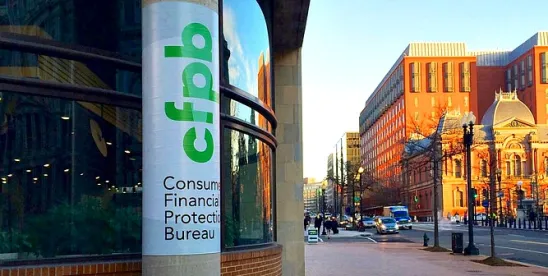Pundits and pontificators have been looking for any sign or indication as to how (and when) the new Trump administration will come into shape with respect to the consumer financial services sector. While only broad outlines of a new (and pronouncedly populist) agenda have begun to take shape, we offer insights below concerning areas of most significant importance to those that provide products and services to consumers and are thus "covered persons" subject to supervision and/or enforcement by the Consumer Financial Protection Bureau (CFPB).
The Agency's Director
As of the date of this publication, it is not yet clear as to whether current CFPB Director Rohit Chopra will resign or instead choose to be fired by then-President Trump on January 20. (Notably, Martin Gruenberg, the Chairman of the Federal Deposit Insurance Corporation, announced on November 19 that he would resign on January 19, 2025.) Although there is no official "short list" that has been dropped (intentionally or inadvertently) in connection with potential hires, we understand that the following individuals are being considered: Brian Johnson, currently with Patomak Global Partners, who formerly worked at the CFPB; Tom Pahl, who formerly worked at both the CFPB and the Federal Trade Commission; and Todd Zywicki, professor, Antonin Scalia Law School, George Mason University. Once Trump picks his Treasury Secretary appointee, it is likely that other financial regulatory picks who complement the Treasury Secretary appointee's policies will also come into focus.
The Agency's Litigation Docket
As of this writing, there are three active cases involving final rules promulgated by the Biden administration's CFPB: (i) the 1071 litigation, related to the Dodd-Frank Wall Street Reform and Consumer Protection Act (Dodd-Frank Act) Section 1071, which requires the collection of certain pieces of information related to the offering and origination of small business credit; (ii) the 1033 litigation, related to the final rules adopted by the CFPB in October 2024 related to consumer "portability" of their account information which were required by Dodd-Frank Act Section 1071; and (iii) the $8 credit card late fee litigation, related to a final rule issued by the CFPB in March 2024, which reduced the maximum permissible credit card late fee that an issuer may charge from $32 to $8.
Katten believes it is most likely that the CFPB's current defense related to the 1071 litigation will be abandoned by a Trump-appointed director of the CFPB; the extensive requirements imposed upon both bank and non-bank small business credit providers were widely perceived in the industry as being overly complex, costly, and unduly burdensome on bank and non-bank small business credit providers. (Notably, the American Bankers Association is a lead plaintiff in the case.) How this plays out will be interesting, however, given that the US District Court in Texas recently held that the final 1071 rule did not exceed the scope of what Congress authorized in the Dodd-Frank Act and did not otherwise violate federal law, causing the plaintiffs to file an appeal with the US Court of Appeals for the Fifth Circuit on October 25. The ensuing litigation in this matter will be of significant interest to the industry, given that the biggest participants in this space currently have compliance obligations that arise in July 2025.
Katten believes that the 1033 litigation filed in the US District Court for Kentucky will continue to be defended by newly appointed CFPB leadership. Given the populist tone of the Trump campaign as well as the stated support by certain senior Republicans (including outgoing Chair of the House Financial Services Committee Patrick McHenry),1 this rule will likely continue to be defended by the new "top brass" at the CFPB. While banks have balked at the lack of protections the final rule provides regarding the transfer of consumers' data to third parties, it seems likely that this rule's populist premise will "ring consistent" with the Trump administration's agenda.
Finally, with respect to the credit card late fee rule, Katten believes, contrary to many in the industry, that it is likely (although not certain) that this rule also survives a CFPB leadership change although the amount of such fee may be subject to further consideration (such that it is nominally or materially greater than $8). While banks have strongly voiced their opposition to the increased costs this cap will impose on their operations as well as the likelihood that services to subprime consumers will have to be trimmed to counter the income losses that such a cap will trigger, Katten believes that the maintenance of this credit card late fee cap will be seen by the Trump administration as consistent with the similar pledge Trump made on the campaign trail related to lowering of maximum credit card interest rates to 10 percent.2 (And Katten separately notes that any lowering of the credit card interest rate cap to 10 percent would likely be met with significant litigation from the states because credit card issuers would have to abandon significant swaths of their customer base who would not qualify for such low interest rates.)
The CFPB's Funding
While not getting much traction in the press as of the date of this writing, there is significant litigation facing the CFPB with respect to its funding and whether its receipt of operating funds from the Board of Governors of the Federal Reserve is consistent with the formula set forth in the Dodd-Frank Act. Unlike the decision recently decided by the US Supreme Court concerning the US Constitution's Appropriations Clause, the current funding question relates to whether or not the Federal Reserve (Federal Reserve) has "combined earnings" to provide to the CFPB to fund that agency's operations consistent with the Dodd-Frank Act's requirements. Critically, the Federal Reserve has not had "earnings" since September 2022. This issue is likely to gain more attention in December — and Congress will need to address it quickly after the inauguration so that those who are strict textualists do not prevail and shutter the agency with successful legal challenges to the agency's current operations.




 />i
/>i
